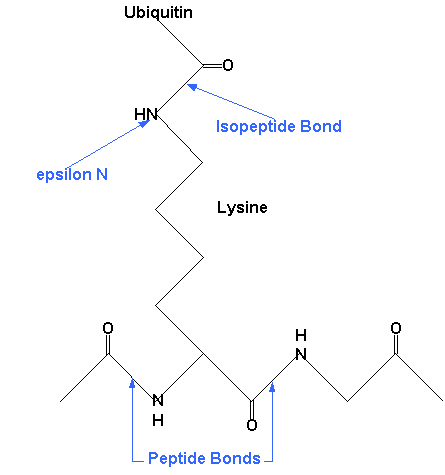
Isopeptide bond
Encyclopedia

Isopeptide bonds can occur between the side chain amine of lysine and the side chain carboxyl groups of either glutamate or aspartate. Bond formation can be either enzyme catalyzed, as in the case for the bond formed between lysine and glutamine catalyzed by transglutaminases, or it can form spontaneously as observed in HK97 bacteriophage
Bacteriophage
A bacteriophage is any one of a number of viruses that infect bacteria. They do this by injecting genetic material, which they carry enclosed in an outer protein capsid...
capsid
Capsid
A capsid is the protein shell of a virus. It consists of several oligomeric structural subunits made of protein called protomers. The observable 3-dimensional morphological subunits, which may or may not correspond to individual proteins, are called capsomeres. The capsid encloses the genetic...
formation and Gram-positive bacterial pili. Spontaneous isopeptide bond formation requires the presence of another residue, glutamic acid, which catalyzes bond formation in a proximity induced manner.
An example of a small peptide containing an isopeptide bond is glutathione, which has a bond between the side chain of a glutamate residue and the amino group of a cysteine residue. An example of a protein involved in isopeptide bonding is ubiquitin, which gets attached to other proteins with a bond between the C-terminal glycine residue of ubiquitin and a lysine side chain of the substrate protein.
Applications
Recently, researchers have exploited spontaneous isopeptide bond formation to develop a new peptide tag called the isopeptagIsopeptag
Isopeptag is a 16 amino acid peptide tag that can be genetically linked to proteins without interfering with protein folding. What makes the isopeptag different from other peptide tags is that it can bind its binding protein through a permanent and irreversible covalent bond...
. The isopeptag
Isopeptag
Isopeptag is a 16 amino acid peptide tag that can be genetically linked to proteins without interfering with protein folding. What makes the isopeptag different from other peptide tags is that it can bind its binding protein through a permanent and irreversible covalent bond...
can spontaneously and irreversibly react with its binding partner to through a covalent isopeptide bond. Application for this exciting new molecular tool include in vivo protein targeting, fluorescent microscopy imaging, and the development of new protein architectures for synthetic biology.

